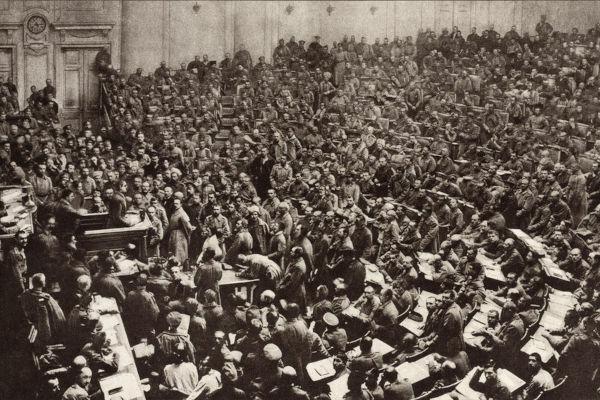LeonTrotsky he was a Russian revolutionary who played a leading role in the Russian Revolution of 1917. He was the second man in Bolshevik-led Russia, but he lost influence when Lenin died. was expelled from Soviet Union and pursued by the agents of Stalin, being murdered in 1940.
Check out our podcast: right, left and center
Summary about Leon Trotsky
Leon Trotsky was born in Ianovka, present-day Ukraine, on November 7, 1879.
He had contact with the ideals Marxists in his youth, when he resided in Nikolaev.
He was even arrested and sent into exile in Siberia twice.
After the October Revolution, he became the second man in the Soviet Union, second only to Vladimir Lenin.
He was expelled from the Soviet Union in 1929 and assassinated by an agent of Stalin in 1940, in his home-in-exile, which was in Mexico.
Origins of Leon Trotsky
Lev Davidovich Bronstein (also spelled Bronshtein) was born in Ianovka on November 7, 1879. He was known in history as Leon Trotsky, and his birthplace is currently located in Ukraine, but at the time it was part of the Russian Empire. Trotsky was part of a family of Jews who integrated into Russian-Ukrainian society.
his parents, DavidLeontyevichbronstein and AnnaLvovna, they were farmers who had prospered. Young Trotsky had two brothers who survived infancy and two who died as children.
At age nine, Trotsky was sent by his family to Odessa (a city also currently located in Ukraine) so that he could study. Trotsky was marked by being a good student, but he had a personality classified as "rebel". From 1896, he moved to Nikolaev (now Mykolaiv) to continue his studies.
political activism
It was in Nikolaev that Trotsky had his first contact with Marxism and revolutionary ideals. During this period, he stopped attending classes to participate in groups that studied and debated Marxism. He eventually returned to Odessa, where he enrolled in Mathematics at the University of Odessa.
However, militancy became more important in Trotsky's life and he decided to drop the course. His involvement in politics led him to participate in the foundation of South Russian Workers Union. Trotsky was active in distributing leaflets to convince workers to join the union.
Political militancy earned Trotsky a prison in 1898. The Russian Empire was ruled by the monarchytsarist, whose posture was extremely authoritarian with revolutionary movements like the one Trotsky was part of. He was imprisoned for two years while awaiting his trial, and when the trial took place in 1900, he was sentenced to four years of exile.
Trotsky's exile was in Siberia, where he married a fellow activist called AleksandraSokolovskaya. In Siberia, Trotsky also had two daughters, Nina and Zinaida. In 1902, he decided to flee exile, and, as part of his disguise, adopted a lifelong pseudonym: Leon Trotsky. After the escape, Trotsky divorced his first wife.
During the period Trotsky was in prison and in exile, the Russian Social Democratic Workers' Party (RDSP) structured itself, but there were many disagreements policies among its members. There were those who defended an action more focused on unionism, while others defended a more revolutionary position, aiming at the overthrow of tsarism.
Trotsky believed that the fight against tsarism was more important.. After escaping from prison, he went into exile in London, and there he worked for the Iskra, a revolutionary newspaper that was smuggled out of the Russia. During this period, Trotsky became close to Vladimir Lenin, one of the great revolutionary leaders in Russia at the time.
At the Iskra, Trotsky acted as a writer of revolutionary articles. In 1903, his approach to Lenin was shaken by the split in the RSDRP. There was an internal dispute, waged by Vladimir Lenin and Julius Martov, over how the party would be run. Lenin advocated a more centralized command, while Martov advocated a less centralized one that would give more freedom of action to members.
Trotsky joined the defense of the construction of the socialism in Russia by a bias democratic and defended that the party should have decentralized command - lines that were adopted by the Mensheviks. This caused Trotsky to be temporarily estranged from Lenin.
However, in time, Trotsky distanced himself from the Mensheviks because he did not agree with their approach to Russian liberals.
Check out our podcast: What is cultural Marxism?
path to revolution
In 1905 Trotsky engaged in the revolutionary struggle with the start of the protests of what became known as 1905 revolution. He returned to Russia shortly after the Bloody Sunday, when Tsar Nicolas II's guard opened fire on a peaceful protest organized by the population of Saint Petersburg.
In St. Petersburg, Trotsky he went on to act with Bolsheviks and Mensheviks. In addition, he became spokesman for the soviet that brought together the city's workers' committee. For its revolutionary performance in the Russian capital, was arrested in 1906 and again sent to Siberia.
Again, Trotsky fled and settled in Vienna, capital of the Austro-Hungarian Empire. From there, the revolutionary joined the Pravda, another clandestine publication that was sent to Russia. He worked for this newspaper until 1912, when its circulation ended. After that, Trotsky was in other cities such as Paris, Zurich and New York.
In 1914, the First World War started, and Trotsky, as well as part of the RSDRP, held anti-war views. Party members who defended this view understood that war was imperialist. THE anti-war performance de Trotsky contributed to his being deported from France and Spain.
Russian Revolution of 1917

He arrived in the United States in early 1917, but, in an attempt to leave the country, was arrested aboard a ship bound for Europe, being taken to Canada. He was released by Russian diplomacy in 1917, and in May of the same year he arrived in Russia.
At the time, the tsarist government had already been overthrown by the February revolution, organized by the Mensheviks. A provisional government was created and Georgy Lvov took over as prime minister of Russia, being later replaced by Aleksandr Kerensky. In the revolutionary context, Trotsky officially joined the Bolshevik bloc.
In Russia, Trotsky took over the leadership of the spetrograd oviet (formerly St. Petersburg) and took part in the struggle against the provisional government. His revolutionary performance throughout 1917 made him the second man of the Bolshevik Party, being below only Lenin himself.
After the October Revolution, Trotsky's first job in the Bolshevik government was to assume the post of People's Commissar for Foreign Affairs. In this role, Trotsky was one of those responsible for the negotiations surrounding Russia's exit from World War I. From these debates, the Brest-Litovsk Treaty.
Afterwards, Trotsky became involved in military affairs and served as head of the Revolutionary Military Committee. In this role, he formed the Red Army, a military force that would fight for the defense of the government communist in Russia. Trotsky played a crucial role in recruiting and leading the Red Army during the years of the Russian Civil War.
→ Video lesson on Russian Revolution of 1917
Last years and death of Leon Trotsky
From 1922, Lenin's leadership in the Soviet Union was weakened by the health problems he suffered. he began to face it because, between 1922 and 1923, Lenin had three strokes that left him with sequelae. This started a dispute within the government regarding a possible succession to power.
![Interior of one of the houses where Trotsky resided in Mexico.[2]](/f/c5e5685a483efb352f6abc871b54a842.jpg)
Lenin had defined Trotsky as “the fittest man on the Central Committee” to succeed him.|1| THE power struggle was fought by four names: LeonTrotsky, Joseph Stalin, grigoryZinoviev and LevKamenev. Furthermore, there was an ideological dispute, as Stalin defended the position of “revolution in one country”, while Trotsky defended the idea of “permanent revolution”, whose bias was internationalist.
Trotsky's position lost strength in the Communist Party of the Soviet Union, and the triumvirate formed by Stalin, Kamenev and Zinoviev managed to isolate the fourth name from the dispute. However, from 1926 onwards, Kamenev and Zinoviev joined with Trostky to fight against Stalin's strengthening, but this union failed.
Stalin managed to seize power from the Soviet Union, using that power to silence his opponents within the party. Between late 1926 and 1927 Trotsky was expelled from the Politburo, the decision-making body of the Soviet government, and from the Central Committee, and eventually he was expelled from the party.
In 1928 Trotsky was exiled to Almaty, Kazakhstan, and in 1929 he was compulsory deported from the Soviet Union. From there, he began to write strong criticisms against the Stalinist regime and he moved constantly, living between 1929 and 1936 in Turkey, France and Norway.
Eventually Trotsky received an invitation to move to the Mexico, and arrived in the country in January 1937. There, she lived in Diego Rivera's house and Frida Kahlo. Trotsky went into exile in Mexico with his second wife, NataliaSedova, whom he had married in 1903 and had two children.
Before moving to Mexico, Trotsky was accused by the Soviet government of conspiring to overthrow Stalin. Because of this and other charges, names like Kamenev and Zinoviev were tried, sentenced to death, and executed.
Trotsky was also tried and Sentenced to deathin absentia (in absence). These trials promoted by the Soviet government were understood by historians as part of the GreatPurge, persecution responsible for the execution of thousands of people in the Soviet Union.
In 1939, Trotsky and his wife moved to a house near Diego Rivera and Frida Kahlo's in Mexico City. This exile was marked by the extramarital affair Trotsky had with artist Frida Kahlo.
With the condemnation in the Soviet Union, Stalin authorized the death of Trotsky. Thus, in May 1940, an armed attack took place in the house Trotsky lived in, but he survived. A few months later, on 20 August 1940, an agent of Stalin's named Ramónmarketer infiltrated Trotsky's house and hit him with a pickaxe hit.
Trotsky died a day later due to the seriousness of the wound. His murderer was arrested and sentenced to 20 years in prison. After he regained his freedom, Ramón Mercader was welcomed into the Soviet Union as a hero.
Note
|1| HUSBAND, William B. The New Economic Policy (NPE) and the revolutionary experience (1921-1929). In.: FREEZE, Gregory L (ed.). Russian history. Lisbon: Editions 70, 2017. for. 335.
Image credits
[1] cream and Shutterstock
[2] BondRocketImages and Shutterstock
by Daniel Neves
History teacher
Source: Brazil School - https://brasilescola.uol.com.br/historiag/leon-trotsky.htm



